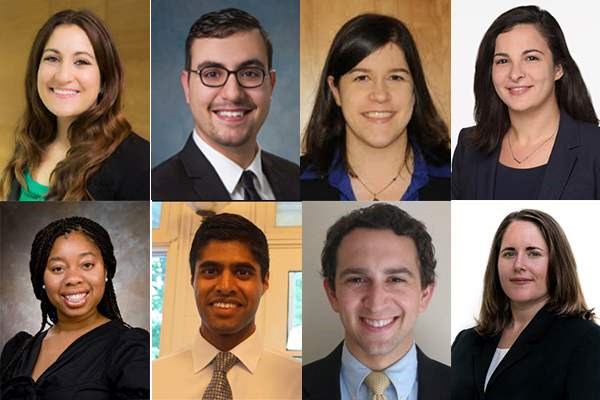This year, the ACEP State Legislative and Regulatory Committee (SLRC) partnered with the EMRA Health Policy Committee to create a mentorship program. Medical students and residents were paired with health policy experts to receive career guidance and further training in health policy.
The program has led to concrete success — not only for the participants, but also for the specialty as a whole. Sign-up is now available online for those seeking a mentor and also for those who would like to serve as a mentor. Access the form on the EMRA Health Policy Committee page.
Why take part in this initiative? Several participants reflected on their own experiences.
JORDAN WARCHOL, MD
Fellow, George Washington University
“My experience with the mentorship program has been excellent. I was paired with someone who had the same interests as me and has had a career path very similar to one I hope to pursue. His mentorship has opened new doors for me, and I hope that even when the program is officially over, I can continue to turn to him for professional advice and mentorship.”
MOODY KASSEM, MD
St. George’s University School of Medicine
“I loved that we were matched with folks who were most aligned with our future interests and that there was opportunity to ask the mentor whatever we wanted. The program was useful, and I would do it again. I recommend it to all prospective medical students interested in Emergency Medicine as a specialty, too!”
MARISA DOWLING, MD
University of Maryland
“The EMRA/SLRC mentorship program has been great for expanding my network and horizons in health policy. EMRA made it so easy to do. My mentor was also very proactive in arranging a meeting, and helped push me to expand my activities in health policy. So I felt very welcome and supported from the start!”
ERICA GOLDSTEIN
New York University School of Medicine
“EMRA/SLRC paired me with a perfect mentor who has focused on getting to know me and has given me exercises on self-awareness, so that I may choose a path that is consistent with my core values. He has been an invaluable sounding board and has helped me identify and approach challenges that I am likely to face throughout my career.”
AGNES USORO, MD
Johns Hopkins University
“I am very appreciative of the opportunity to be a part of the EMRA/SLRC mentorship program. I have learned so much from my mentor about ACEP’s current efforts to improve the practice of emergency medicine for all EM physicians. Our conversations included issues related to the prudent layperson standard, payment reform through MACRA, and the ACEP Single Payer Task Force. Most memorably, I had the pleasure of attending ACEP’s 2018 Leadership and Advocacy Conference, where I was able to meet him in person. His mentorship has strengthened my passion for becoming a lasting advocate for emergency medicine physicians.”
GURURAJ SHAN, MD
SUNY Downstate/Kings County
“The EMRA/SLRC mentorship program has been a rewarding and educational experience. My mentor provided unique advice regarding future career paths and options for how I can pursue them. Additionally, she introduced me to leaders within NY ACEP and helped get me involved in their Government Affairs Committee, which has jump-started my health policy education.”
SAR MEDOFF, MD
Emory University
“Thanks to the program I was paired with an emergency physician in private practice who was previously academic faculty. Through our conversations I learned about her experiences with both the Tennessee and Iowa ACEP chapters as well as her suggestions for getting more involved in advocacy work moving forward plus contacting my legislators about issues that are important to me. My mentor has been a great role model for my advocacy work thus far and I look forward to working alongside her to advance Emergency Medicine in the years to come.”
HANNAH GORDON
FIU Herbert Wertheim College of Medicine
“I feel so humbled and energized to be part of such an amazing program. I was extremely fortunate to be partnered with my mentor, whose advocacy work directly reflected my intention to help develop and implement health policy as an attending. She has supported me at both LAC and EM Days, Florida’s legislative days, by guiding me in how best to approach legislators, understand ACEP’s policy priorities, and network. This assistance helped me organize a session at EM Days that brought together a Florida State Representative, an EMR expert, and a legislative Chief of Staff to discuss future legislation to prevent duplicative testing in Florida’s EDs.”
The Mentors
Special thanks to these physicians who offered their time and service as mentors this year.
- Andrew I. Bern, MD, FACEP
- Anthony Cirillo, MD, FACEP
- John R. Corker, MD
- Maria Guyette, MD, FACEP
- Marilyn Heine, MD, FACEP
- Sarah Hoper, MD, JD, FACEP
- Chadd Kraus, DO, DrPH, MPH, FACEP
- Jim Mitchiner, MD, MPH, FACEP
- Ashley Norse, MD, FACEP
- Steve Sherick, MD, FACEP
- Nicholas Vasquez, MD, FACEP
- Anne Zink, MD, FACEP
The EMRA Health Policy Committee hopes to expand this program. Please sign up on the EMRA website! All are welcome.
Additional ways to learn about health policy advocacy firsthand:
- Write for the Health Policy Journal Club, which examines health policy literature every month. Email healthpolicyctte@emra.org to sign up.
- Attend the ACEP Leadership & Advocacy Conference in Washington, D.C. It's May 5-8, 2019.
- Join the 911 Network. This will keep you up-to-the-minute on legislative matters.



